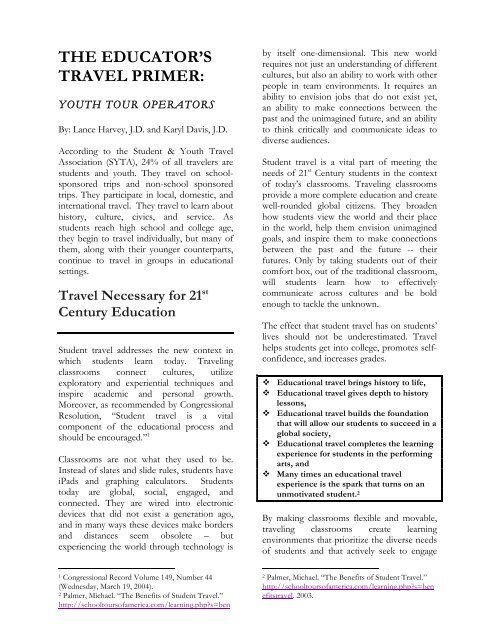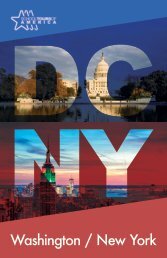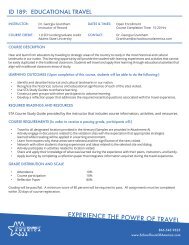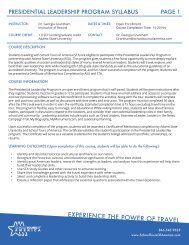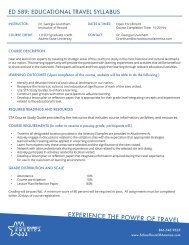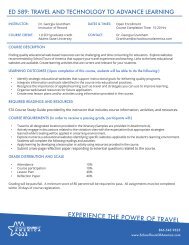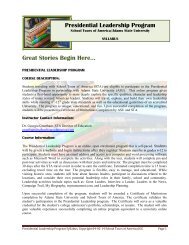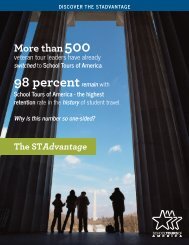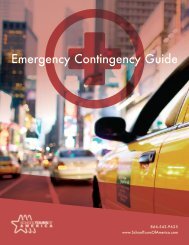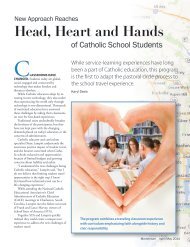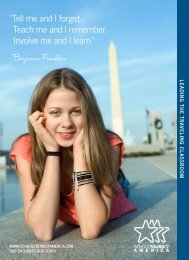THE EDUCATOR’S TRAVEL PRIMER: Youth Tour Operators
You also want an ePaper? Increase the reach of your titles
YUMPU automatically turns print PDFs into web optimized ePapers that Google loves.
<strong>THE</strong> <strong>EDUCATOR’S</strong><br />
<strong>TRAVEL</strong> <strong>PRIMER</strong>:<br />
YOUTH TOUR OPERATORS<br />
By: Lance Harvey, J.D. and Karyl Davis, J.D.<br />
According to the Student & <strong>Youth</strong> Travel<br />
Association (SYTA), 24% of all travelers are<br />
students and youth. They travel on schoolsponsored<br />
trips and non-school sponsored<br />
trips. They participate in local, domestic, and<br />
international travel. They travel to learn about<br />
history, culture, civics, and service. As<br />
students reach high school and college age,<br />
they begin to travel individually, but many of<br />
them, along with their younger counterparts,<br />
continue to travel in groups in educational<br />
settings.<br />
Travel Necessary for 21 st<br />
Century Education<br />
Student travel addresses the new context in<br />
which students learn today. Traveling<br />
classrooms connect cultures, utilize<br />
exploratory and experiential techniques and<br />
inspire academic and personal growth.<br />
Moreover, as recommended by Congressional<br />
Resolution, “Student travel is a vital<br />
component of the educational process and<br />
should be encouraged.” 1<br />
Classrooms are not what they used to be.<br />
Instead of slates and slide rules, students have<br />
iPads and graphing calculators. Students<br />
today are global, social, engaged, and<br />
connected. They are wired into electronic<br />
devices that did not exist a generation ago,<br />
and in many ways these devices make borders<br />
and distances seem obsolete – but<br />
experiencing the world through technology is<br />
by itself one-dimensional. This new world<br />
requires not just an understanding of different<br />
cultures, but also an ability to work with other<br />
people in team environments. It requires an<br />
ability to envision jobs that do not exist yet,<br />
an ability to make connections between the<br />
past and the unimagined future, and an ability<br />
to think critically and communicate ideas to<br />
diverse audiences.<br />
Student travel is a vital part of meeting the<br />
needs of 21 st Century students in the context<br />
of today’s classrooms. Traveling classrooms<br />
provide a more complete education and create<br />
well-rounded global citizens. They broaden<br />
how students view the world and their place<br />
in the world, help them envision unimagined<br />
goals, and inspire them to make connections<br />
between the past and the future -- their<br />
futures. Only by taking students out of their<br />
comfort box, out of the traditional classroom,<br />
will students learn how to effectively<br />
communicate across cultures and be bold<br />
enough to tackle the unknown.<br />
The effect that student travel has on students’<br />
lives should not be underestimated. Travel<br />
helps students get into college, promotes selfconfidence,<br />
and increases grades.<br />
! Educational travel brings history to life,<br />
! Educational travel gives depth to history<br />
lessons,<br />
! Educational travel builds the foundation<br />
that will allow our students to succeed in a<br />
global society,<br />
! Educational travel completes the learning<br />
experience for students in the performing<br />
arts, and<br />
! Many times an educational travel<br />
experience is the spark that turns on an<br />
unmotivated student. 2<br />
By making classrooms flexible and movable,<br />
traveling classrooms create learning<br />
environments that prioritize the diverse needs<br />
of students and that actively seek to engage<br />
1 Congressional Record Volume 149, Number 44<br />
(Wednesday, March 19, 2004).<br />
2 Palmer, Michael. “The Benefits of Student Travel.”<br />
http://schooltoursofamerica.com/learning.php?s=ben<br />
2 Palmer, Michael. “The Benefits of Student Travel.”<br />
http://schooltoursofamerica.com/learning.php?s=ben<br />
efitstravel. 2003.
students. Schools can tailor the travel<br />
experience to fit with the themes of the<br />
school, the subject matter being taught in the<br />
traditional classroom, and the interests and<br />
needs of the students. Schools can choose a<br />
destination that ties in curriculum objectives<br />
but also gives students the freedom to have<br />
hands-on interaction, not simply lecturing.<br />
Being at the battlefield is better than being in<br />
the classroom because it engages a broader<br />
range of learning types and develops a<br />
broader range of cognitive learning skills.<br />
Why Hire a <strong>Tour</strong> Operator?<br />
1. Knowledge<br />
<strong>Tour</strong> operators have experience negotiating<br />
with multiple companies, attractions, and<br />
restaurants. They know how to make the trip<br />
run as smoothly as possible because they plan<br />
so many of them, ideally to the same location.<br />
Most importantly, qualified student tour<br />
operators have security details planned that<br />
reduce liability.<br />
2. Time<br />
Planning student travel takes time. A quality<br />
tour operator who frequently leads tours to<br />
the destination selected will be able to help<br />
plan everything from food and lodging that<br />
safely meets the needs of large groups of<br />
students to lesson plans that relate to the<br />
school’s curriculum. <strong>Tour</strong> operators can<br />
provide a sample itinerary, lesson plans,<br />
releases, and safety checklists. With a tour<br />
operator, schools do not have to recreate the<br />
wheel. Not only can tour operators work with<br />
schools to provide a unique educational<br />
experience, but they can also provide the<br />
support schools, parents, and students require<br />
through the process over the phone, online,<br />
and on tour.<br />
3. Accounting and Fundraising Issues<br />
A qualified student tour operator should have<br />
its own accounting department and customer<br />
service department, which will remove the<br />
need for the teacher to take large sums of<br />
cash from students and to field dozens of calls<br />
and questions everyday. The tour operator is<br />
also likely to be familiar with successful<br />
fundraising strategies and should be able to<br />
offer students assistance in choosing a<br />
fundraiser, applying for scholarships and even<br />
assisting the group in applying for possible<br />
grant money.<br />
4. Safety and Emergency Planning<br />
While you might not be a believer in<br />
“Murphys’ Law,” if you are a teacher<br />
responsible for taking fifty 8 th -graders across<br />
the country for a week, you better be prepared<br />
for a number of contingencies. Whether you<br />
have a disciplinary issue, a lost child, a<br />
weather-related emergency such as a<br />
snowstorm that keeps you stranded in an<br />
airport or at your destination or a participant<br />
or chaperone that becomes ill, a qualified<br />
student tour operator will provide you with<br />
the instant support you need to effectively<br />
handle the emergency on the spot,<br />
communicate with local authorities as well as<br />
your parents back home and make sure the<br />
tour continues forward safely. If for no other<br />
reason than this, you will be more than<br />
grateful you utilized the services of a tour<br />
company the very first time you run into an<br />
emergency situation on tour.<br />
5. Insurance Protections and Liability<br />
In addition to having detailed emergency<br />
plans, tour operators should also carry<br />
medical and accidental injury insurance that<br />
will cover the students and professional<br />
liability insurance (known as “professional<br />
errors and omissions”) for the tour leaders<br />
and chaperones. Even on non-school<br />
sponsored trips, the tour operator should be<br />
able to add the name the school and diocese<br />
to the specific insurance policy, upon request.<br />
To reduce potential liability, in addition to<br />
providing insurance coverage, tour operators<br />
2 <br />
<strong>THE</strong> <strong>EDUCATOR’S</strong> <strong>TRAVEL</strong> <strong>PRIMER</strong>: Selecting a <strong>Youth</strong> <strong>Tour</strong> Operator
should provide medical and behavior release<br />
forms and should follow best practices of tour<br />
operators as demonstrated by membership in<br />
professional organizations such as SYTA.<br />
How to Choose the Right<br />
<strong>Youth</strong> <strong>Tour</strong> Operator<br />
Start by finding a number of companies<br />
that specialize in youth travel<br />
Because the majority of tour planners cater to<br />
adults, it is important to choose a tour<br />
operator that has experience working with<br />
groups of students and experience traveling to<br />
the selected destination. In fact, there is an<br />
entire industry of travel professionals<br />
dedicated exclusively to student travelers. The<br />
most respected industry organization is called<br />
the Student <strong>Youth</strong> <strong>Tour</strong> Association, also<br />
known as SYTA.<br />
SYTA is largely known as the “voice of<br />
student and youth travel” and requires its<br />
members to meet financial integrity criteria<br />
and adhere to a strict Code of Ethics,<br />
ensuring financial stability. Furthermore, its<br />
member companies enjoy a vast network of<br />
available resources with youth appropriate<br />
vendors and most importantly, with the<br />
necessary governmental agencies in the event<br />
of a tour-related or national emergency.<br />
SYTA has successfully resolved dozens of<br />
large-scale emergencies and its members enjoy<br />
an experienced contingency network.<br />
To search for a SYTA member company, log<br />
onto www.syta.org, click on “FIND A SYTA<br />
OPERATOR” and search by company name<br />
or destination. SYTA also publishes a<br />
brochure titled “Educators Buyer Guide”<br />
which is a list of its member tour company<br />
and associate, “youth-friendly” tour vendors<br />
and suppliers (such as transportation<br />
companies, hotels, restaurants, museums,<br />
theme parks, etc.). Once you have a list of<br />
qualified student tour operators, you must<br />
find the one that is the best fit for your tour.<br />
Like any industry, not every industry member<br />
is right for your school. The following factors<br />
represent the best practices of the industry<br />
and should be considered when hiring a tour<br />
operator:<br />
Compare the companies based upon these<br />
industry “best practices” standards<br />
• Destination Experience<br />
The tour operator should have actual<br />
experience taking student groups to your<br />
desired destination and should be able to<br />
provide you with a number of sample<br />
itineraries of tours they have run. They<br />
should also be able to provide you<br />
references of clients who have traveled<br />
with them to those destinations. The<br />
experience a company has with a<br />
particular destination is important because<br />
its planners will have inside knowledge of<br />
the complexities posed during the time<br />
you visit and will have a network of strong<br />
connections with the local sites and<br />
vendors that can prove to be very<br />
important. For example, a good operator<br />
will book as many appointments as<br />
possible for you to avoid hours of long<br />
lines. Lastly, find out if the company<br />
actually has their own staff conducting the<br />
tours of the destination or whether they<br />
will instead hire a “receptive tour operator”<br />
(an RTO or Receptive) to run the tour.<br />
One word of caution here is that tour<br />
operators who claim to specialize in 10 or<br />
more destinations are usually going to be<br />
hiring a receptive tour operator to<br />
represent them while on the tour.<br />
• Company History and Stability<br />
Obviously, when dealing with a company<br />
that will be responsible for your safety and<br />
thousands of dollars of your students’<br />
money, you want to be sure the company<br />
is financially sound and ethical. As stated<br />
above, the easiest way to determine a<br />
company’s soundness is to make sure it is<br />
a member of SYTA. It would also be wise<br />
<strong>THE</strong> <strong>EDUCATOR’S</strong> <strong>TRAVEL</strong> <strong>PRIMER</strong>: Selecting a <strong>Youth</strong> <strong>Tour</strong> Operator <br />
3
4 <br />
to check consumer websites such as the<br />
Better Business Bureau. In certain states<br />
such as California, Florida, Washington,<br />
Iowa, Hawaii, and Nevada, companies<br />
must be registered with the state as a<br />
“seller of travel” and should be able to<br />
give you their registration number. You<br />
also should enquire how long the<br />
company been in business at their present<br />
location. A company that has been in<br />
business for many years at one location is<br />
more likely to be a reputable business that<br />
stands by their customers.<br />
• Educational Focus<br />
If the tour’s focus is educational then look<br />
to see if the tour operator’s programs are<br />
accredited and if so, by whom. If the<br />
students are seeking college credit that will<br />
be potentially transferrable then the tours<br />
should be accredited by a national, public<br />
university. Some companies may claim to<br />
be their own accredited institution but<br />
their credits may not be transferrable or<br />
accepted by your school system. You may<br />
also want to verify if the company will<br />
provide teachers with classroom tools,<br />
tour resources, and a variety of ways to<br />
receive graduate credit and professional<br />
development. In order to avoid the<br />
possibility your credits may be “diploma<br />
mill” and may not be transferable, you<br />
may wish to evaluate the school’s<br />
reputation using the Department of<br />
Education website at<br />
http://www.ope.ed.gov/accreditation/.<br />
• Chaperone Ratios<br />
It is vitally important that the tour provide<br />
you with the proper number of<br />
chaperones at no cost. Recruiting the right<br />
number of chaperones will help ensure a<br />
safe and successful trip. Most tour<br />
providers offer a certain number of free<br />
spots for chaperones based upon the<br />
number of students traveling. A common<br />
ratio is one chaperone for every 15<br />
students for high school students, with<br />
one for every 10 to 15 for middle school<br />
<strong>THE</strong> <strong>EDUCATOR’S</strong> <strong>TRAVEL</strong> <strong>PRIMER</strong>: Selecting a <strong>Youth</strong> <strong>Tour</strong> Operator <br />
students. If you require more, make sure<br />
this is included in your written bid with<br />
the tour operator.<br />
• Hotel<br />
This is definitely an area to focus on.<br />
Many companies will say they use quality<br />
hotels but will not specify a location.<br />
Hotels outside metro areas save the<br />
company 50% but your group may lose 1-<br />
2 hours of “tour time” each day en route<br />
with rush hour traffic. You want to make<br />
sure the company tells you at a minimum<br />
the category of hotel (3-star, 4 star) and<br />
how far from the destination it is. If your<br />
hotel is an hour from your destination,<br />
over a 5-day tour you will have lost an<br />
entire day of sight-seeing in drive time.<br />
The safety of the neighborhood where the<br />
hotel is located is also important. You also<br />
want to know some essential features of<br />
the hotel such as: do the rooms have<br />
closed hallway entrances only, does it have<br />
a pool and lifeguard, will there be 24-hour<br />
security, will the students and chaperones<br />
all be blocked together on the same<br />
hallway, does the hotel have the ability to<br />
turn off pay-tv and remove minibars, do<br />
the rooms have windows that open up or<br />
have they been secured, are there<br />
adjoining rooms between boys and girls<br />
rooms, and will other guests likely be on<br />
your hallway? As you can see there will be<br />
a lot to cover at the hotel, so most<br />
importantly you want to confirm that a<br />
representative of the tour operator will be<br />
at your hotel ahead of time to ensure the<br />
blockings and safety of the rooms before<br />
your arrival.<br />
• Meals<br />
While this may not sound as important,<br />
you and your students will be hungry at<br />
meal time, and you want to make sure that<br />
the restaurants are of sufficient quality and<br />
convenient. You also need to ensure that<br />
3 meals a day are provided or else make<br />
other arrangements. Students left to<br />
purchase a meal a day on their own, tend
to spend the money on other things and<br />
may not eat. With respect to breakfasts,<br />
you need to confirm whether breakfasts<br />
are full meals or continental. Additionally,<br />
while food courts and fast food may be<br />
convenient and even necessary sometimes,<br />
you want to make certain the tour<br />
operator does not plan to feed you only at<br />
fast food restaurants. Finally, confirm that<br />
the tour operator is providing multiple<br />
entrée choices at each location and can<br />
accommodate any particular health<br />
allergies or requirements.<br />
• <strong>Tour</strong> Guides<br />
First, you want to confirm that you will<br />
have a professional and licensed tour<br />
guide at all locations where you will need<br />
one. Second, you want to know<br />
something about the quality of the guide<br />
because this is the person who will likely<br />
make or break the trip. Depending on the<br />
purpose and focus of the trip, a local tour<br />
guide with knowledge can serve as a living<br />
history book as they deliver the factual<br />
background at the actual site of historical<br />
significance. You should also find out if<br />
the tour guide will be separate from the<br />
driver as many guides perform both<br />
functions. Most important is the<br />
experience the guide has with youth.<br />
Many tour guides are excellent with adult<br />
groups but terrible communicating with<br />
students. The best way to ensure a good<br />
guide is to ask for client references. You<br />
should also ask how many guides you will<br />
have, especially if you have a large group.<br />
• <strong>Tour</strong> Support<br />
While you may be working with only one<br />
representative to plan the tour itinerary,<br />
you want to make sure that you will have<br />
ample support and personnel available to<br />
assist once you arrive at the destination.<br />
A qualified tour operator should have a<br />
representative greet your group at the<br />
airport on arrival and make sure you meet<br />
your guides to begin the tour. They should<br />
also provide a representative to prepare<br />
for your arrival at the hotel, assist with<br />
check-in and should be present at the<br />
hotel while you and your group are inhouse.<br />
Some of the companies servicing<br />
international destinations often have the<br />
guide also serve as the hotel representative<br />
as you may be traveling across the country.<br />
The important factor is that you as the<br />
tour leader feel you have the necessary<br />
support at all times, 24 hours a day,<br />
without exception. A thorough, quality<br />
operator should provide you with the<br />
support you need on arrival, on tour, at<br />
the hotels and all the way through to your<br />
departure home.<br />
• Emergency, Medical & Behavior<br />
This is obviously of utmost importance<br />
and one of the reasons a SYTA tour<br />
operator is a wise decision. A quality tour<br />
operator should have a staffed “tour<br />
central office” near the destination.<br />
Additionally, they should be able to<br />
provide every student and parent a 24-7,<br />
toll free emergency number for<br />
emergencies of any kind. If overseas, there<br />
should be contingencies established for<br />
the same. The company should be able to<br />
contact your drivers and guides at all times<br />
and should have contingency emergency<br />
plans in place. The company should be<br />
able to plan for medical emergencies by<br />
providing quick access to a nearby<br />
hospital and for non-emergencies, arrange<br />
for a doctor or nurse to travel to the<br />
group at the hotel to minimize separations.<br />
Finally, the company should also be able<br />
to provide you the necessary support if<br />
you must send a student home for either<br />
disciplinary reasons or a family emergency.<br />
• Nighttime Security<br />
A tour operator should arrange to have<br />
private security or hall chaperones in place<br />
each night so the tour leaders can get a<br />
good night of sleep. Quality tour<br />
operators generally provide private,<br />
bonded, professional security guards to sit<br />
on each hotel floor your group is staying<br />
<strong>THE</strong> <strong>EDUCATOR’S</strong> <strong>TRAVEL</strong> <strong>PRIMER</strong>: Selecting a <strong>Youth</strong> <strong>Tour</strong> Operator <br />
5
on from curfew to 5 a.m. You should<br />
confirm that this is the case and that<br />
“security” is not simply the hotel’s guard<br />
or a roving guard that will leave your<br />
students’ floor throughout the night.<br />
While many veteran leaders will tell you<br />
that “taping” the doors is effective, kids<br />
today are far too clever, and the tape will<br />
not stop an intruder from coming onto<br />
the floor. Finally you want to make sure<br />
the security guards or chaperones have<br />
undergone criminal background checks<br />
and been trained to work with youth<br />
travelers as they often require a little<br />
different temperament from a guard.<br />
• Costs & Additional Fees<br />
This is another important fact to discover<br />
upfront in order to ensure the bids you<br />
are comparing are the same. The<br />
company’s bid will be based upon a group<br />
rate. For instance, the bid may say “based<br />
on 35 full paid registrants.” Generally, this<br />
means that if you do not hit your 35 mark,<br />
the company will bill each person an<br />
upcharge. Some companies may offer to<br />
combine you with another group, which<br />
will probably mean compromising on<br />
your itinerary. You need to establish in<br />
writing, what the pro-rated amount per<br />
student will be if you do not hit the mark<br />
and your available options. You also want<br />
to be very familiar with the company’s<br />
cancellation penalties if a student decides<br />
to cancel a trip or if you are forced to<br />
cancel a trip. You also want to know<br />
under what circumstances you may cancel<br />
and whether the company offers travelers<br />
any type of refund guarantee they can<br />
purchase if they need to cancel at the last<br />
minute. Finally, you should be prepared<br />
for emergency situations and confirm with<br />
the company the plan for billing in the<br />
event of an emergency that requires your<br />
group to stay additional days at the<br />
destinations. In the event an airline is at<br />
fault (such as mechanical), the airline will<br />
cover the expenses of meals and lodging.<br />
If the delay, however, is weather related,<br />
the airlines will not cover the expense. A<br />
quality tour operator should be able to<br />
arrange whatever support and lodging is<br />
necessary in an emergency and some,<br />
believe it or not, will agree to cover the<br />
costs associated out of a gesture of good<br />
will.<br />
• Insurance Protection<br />
As stated before as a primary reason to<br />
use a student tour operator, an operator<br />
should provide medical and accident<br />
insurance to cover all participants and<br />
should include professional errors and<br />
omissions insurance protecting the tour<br />
leaders, chaperones and diocese.<br />
Moreover, if requested, the company<br />
should be able to individually list the<br />
school and diocese in the actual policy,<br />
adding yet another layer of protection for<br />
your diocese. With regard to international<br />
travel, insurance may be a bit tricky and<br />
the company may not provide all of the<br />
necessary coverage. In this case, you need<br />
to factor in the extra expense of private<br />
insurance and establish in writing what the<br />
emergency medical procedures will be and<br />
the availability of a private hospital or<br />
doctor abroad. If the tour involves an<br />
element of risk, you may request the<br />
possibility of a medical professional<br />
traveling with the group throughout the<br />
tour. This is definitely an area where you<br />
want to understand your options before<br />
an emergency actually arises.<br />
Ask questions, get bids, call references,<br />
and confirm in writing<br />
When it comes to comparing tour operators,<br />
make sure to ask a lot of questions and the<br />
right questions, get multiple bids, call<br />
references, and confirm everything in writing.<br />
Make sure to compare apples to apples in<br />
order to get the best possible value for parents<br />
6 <br />
<strong>THE</strong> <strong>EDUCATOR’S</strong> <strong>TRAVEL</strong> <strong>PRIMER</strong>: Selecting a <strong>Youth</strong> <strong>Tour</strong> Operator
and students. Keep in mind of course that<br />
when it comes to choosing a tour operator,<br />
cheapest is rarely the best, nor is necessarily<br />
choosing the biggest business. With each<br />
company, if you do your homework upfront,<br />
you and your students will be able to enjoy a<br />
safe, stress-free experience that they will<br />
remember for the rest of their lives.<br />
The following are some key checklists to<br />
assist the teacher in the selection process.<br />
Questions to ask about dependability:<br />
o What professional organizations do you<br />
belong to?<br />
o Are you a member of the Student <strong>Youth</strong><br />
Travel Association- SYTA?<br />
o How long have you been in business at<br />
the present location?<br />
o How long has your current owner(s)<br />
owned the business?<br />
o What type of consumer protections do<br />
you provide?<br />
o What is your cancellation policy?<br />
o Who will pay for unforeseen expenses?<br />
o Will you provide a sample contract?<br />
o Can you provide contact information<br />
for other educators in my area?<br />
o Do you have any administrator<br />
references?<br />
o When taking bids, do you have<br />
references from any teachers who have<br />
traveled with the other companies?<br />
o Will you have a hotel rep stay with the<br />
group?<br />
o Will you provide a private, bonded<br />
security guard on our floor at night?<br />
o Do you use an on-call doctor service?<br />
o Do all of your tour personnel undergo<br />
background checks?<br />
o Do your tour vendors undergo<br />
background checks and drug screenings?<br />
o What precautions do you take to keep<br />
students from getting lost?<br />
o How will parents/administrators<br />
communicate with those on tour?<br />
o Do you have a local tour central office<br />
with toll free number?<br />
o Will you sign off on a safety checklist?<br />
Questions to ask about quality:<br />
o What is your company’s area of<br />
expertise or specialization?<br />
o Have you run this tour before?<br />
o How long have your tour guides been<br />
with the company?<br />
o What curriculum support do you<br />
provide teachers?<br />
o How close will the hotel be to<br />
destination?<br />
o Do you run your own tour operations<br />
or outsource to a receptive?<br />
o What is the average number of times a<br />
teacher travels with the company?<br />
Questions to ask about safety:<br />
o What type and level of insurance do you<br />
carry?<br />
o What kind of safety precautions do you<br />
take at the hotel?<br />
<strong>THE</strong> <strong>EDUCATOR’S</strong> <strong>TRAVEL</strong> <strong>PRIMER</strong>: Selecting a <strong>Youth</strong> <strong>Tour</strong> Operator <br />
7
About the Authors<br />
Mr. Lance Harvey is an attorney and was<br />
raised in the educational tour field, with nearly<br />
three decades of industry experience. He<br />
graduated from Emory University (BA, 1992)<br />
and was the Leon Jaworski Scholar and<br />
highest-ranking member of Baylor Law<br />
School (JD 1995). Lance served on the Board<br />
of Directors of the largest student travel<br />
organization in the country and practiced law<br />
at the national firm of Andrews & Kurth, LLP.<br />
Lance assembled a team of the industry’s top<br />
experts and founded School <strong>Tour</strong>s of<br />
America in 2002. Over the last 10 years,<br />
Lance has worked with administrators,<br />
superintendents and teachers to create<br />
innovative learning experiences for Catholic<br />
youth while protecting the school, chaperones<br />
and diocese.<br />
Ms. Karyl Davis is an attorney and former<br />
educator. Prior to going to law school, Karyl<br />
was the Peer Education Coordinator for the<br />
University of Alabama Women’s Resource<br />
Center. Karyl has served on the board of the<br />
Georgia Association for Women Lawyers<br />
Foundation for the past 6 years and is the<br />
Immediate Past President. She graduated<br />
from the University of Alabama School of<br />
Law where she was an editor of the Law<br />
Review, a Public Interest Board Member, a<br />
Dean’s Scholar, and upon graduation received<br />
the Dean's Community Service Award and the<br />
James E. Morrisette Constitutional Law<br />
Award. In addition to her law degree, Karyl<br />
graduated summa cum laude with a Bachelor<br />
of Arts degree from Carson-Newman College<br />
in English and Communication Studies and<br />
summa cum laude with a Master of Arts<br />
degree from the University of Alabama in<br />
Communication Studies<br />
About School <strong>Tour</strong>s of America<br />
School <strong>Tour</strong>s of America is a full-service<br />
educational tour company. Our programs<br />
create traveling classrooms for American<br />
youth to the actual locations of historical<br />
significance, giving students the ultimate<br />
opportunity to experience first-hand our<br />
nation’s centers of history, government,<br />
culture and commerce. Our most popular<br />
destinations include Washington DC, New<br />
York City, Colonial Virginia, Boston,<br />
Philadelphia and Orlando.<br />
STA is truly a unique company. After building<br />
two of the nation’s largest and most<br />
successful student tour companies, ten of the<br />
industries most respected and innovative<br />
veterans joined forces in 2002 to offer a fresh,<br />
new concept in student travel based on<br />
customization.<br />
Personal tour coordinators create learning<br />
experiences based on curriculum goals, tour<br />
preferences, master guides, restaurants, hotels<br />
and flight schedules. Partnered with Adams<br />
State University, teachers leading the trips can<br />
earn graduate credit while students can earn<br />
undergraduate credit or leadership credentials<br />
for their college portfolio. To learn more<br />
about STA, please visit:<br />
www.schooltoursofamerica.com<br />
8 <br />
<strong>THE</strong> <strong>EDUCATOR’S</strong> <strong>TRAVEL</strong> <strong>PRIMER</strong>: Selecting a <strong>Youth</strong> <strong>Tour</strong> Operator


